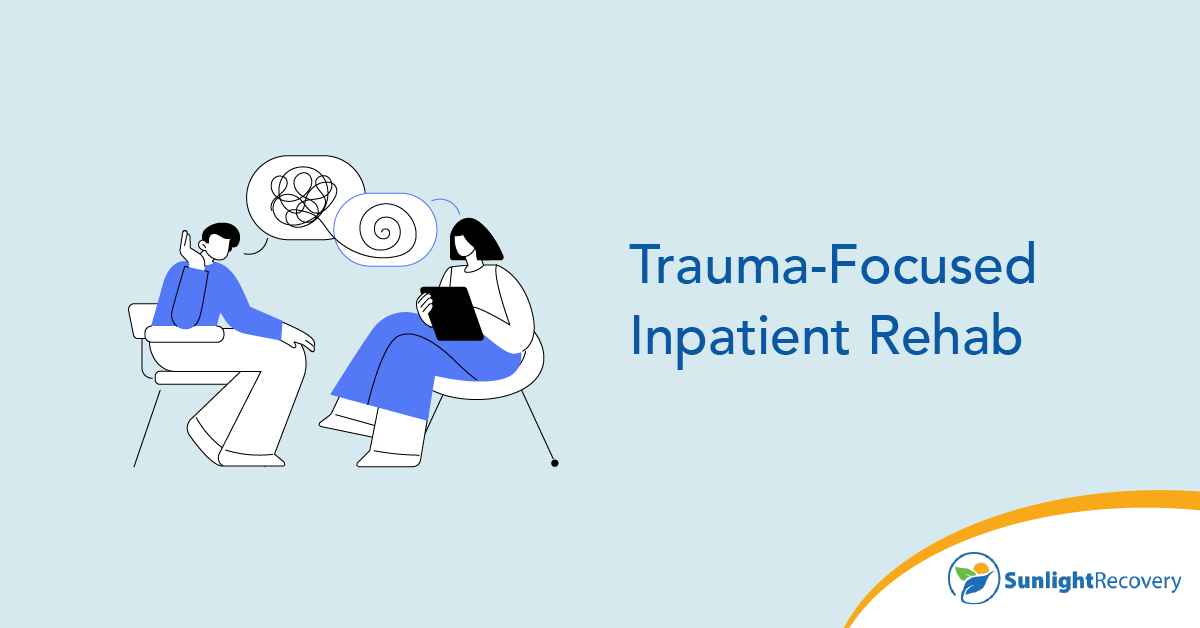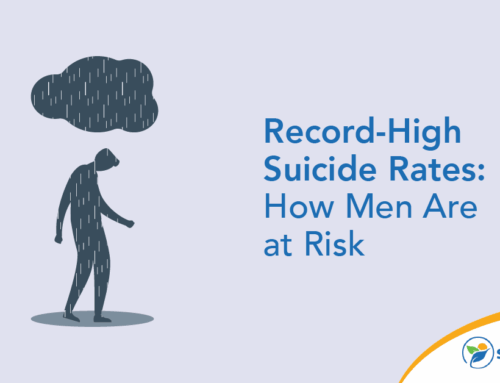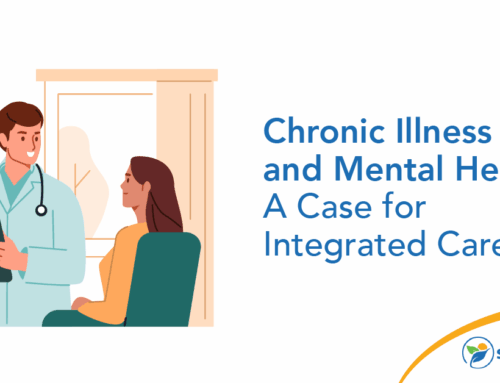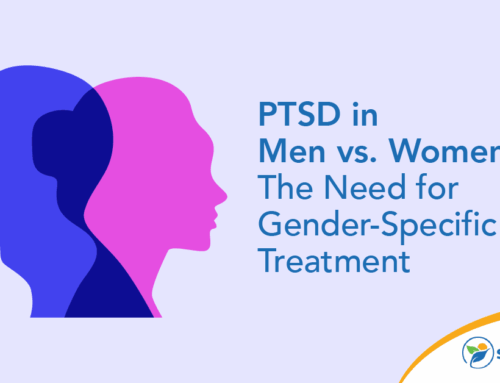Are you looking for inpatient PTSD treatment centers? Residential treatment is more effective for people with co-occurring PTSD and substance abuse dependency.
Unresolved trauma is debilitating, and people suffering from post-traumatic stress disorder and other trauma often resort to self-medication to cope with their symptoms. Unfortunately for many, self-medication doesn’t work. It often makes the condition worse and may lead to substance abuse and dependence.
Treatment options at PTSD treatment centers include inpatient and outpatient counseling. Inpatient therapy is effective as it provides a safe place for someone struggling with PTSD and other trauma to work through their fears while receiving medications that help alleviate symptoms.
Trauma and addiction are often very much connected. Trauma counseling and addiction rehab should be conducted together for the best chance of maintaining sobriety.
What Is Trauma?
The Substance Abuse and Mental Health Services Administration, or SAMHSA, defines trauma as any event or circumstance that can result in serious physical or emotional harm.
Some traumatic experiences that may lead to PTSD include being involved in or seeing:
- Physical abuse, neglect or violence, especially within families
- Psychological abuse
- Sexual abuse
- Traumatic separation
- Violence, including shooting
- Loss of a loved one
- War and mass terrorism
- Serious accidents
Many people experiencing severe trauma find the event has a lasting effect on their emotional psyche. It’s extremely difficult for them to move on, and they may experience multiple symptoms, including:
- Flashbacks, or reliving the traumatic experience
- Nightmares associated with the trauma
- Extreme anxiety
- Emotional instability
- Fear, anger or aggression
- Physical symptoms, such as aches, shaking, sweating and rapid heart rate and breathing
- Severe sleep disturbance
- Impaired concentration
- Inability to function normally
The Incidence of Trauma
Trauma is a widespread, global occurrence affecting people regardless of race, ethnicity, age, gender or socioeconomic background. Unfortunately, it’s a common experience for Americans. According to the National Center for PTSD, around 6 out of every 100 people experience PTSD at some time in their lives.
Children are particularly susceptible to trauma. SAMHSA reports that 2 in 3 children experience at least one traumatic incident before age 16, and nearly 15% experience abuse every year. Research has found that trauma, especially when it takes place during childhood, is often connected with chronic health conditions and behavioral issues, such as substance use. PTSD-related trauma can pose tremendous challenges in careers, relationships and family life, so it’s important to explore healing and counseling options to best tackle trauma and promote recovery.
How Trauma Affects the Brain
The stress from trauma alters the brain chemistry, much like disorders and addictions. For example, if someone is being assaulted, they may freeze and not fight back because the brain’s defense response takes over rational thinking processes.
Stress responses have implications in the amygdala, prefrontal cortex and hippocampus. The amygdala’s function is to detect and respond to threats. In people with PTSD, the amygdala becomes hyperactive, resulting in an exaggerated response to perceived threats. In normal situations, the cortex controls the response of the amygdala, but with PTSD, its balance is weakened and its emotional regulation capabilities are disrupted. The hippocampus manages memories, but in PTSD sufferers, it’s often less active, which can cause memory problems.
Trauma is also linked to increased releases of cortisol and norepinephrine in the body. It’s been found to shrink regions of the brain and impair memory.
Trauma, and the potential ramifications of such experiences, shouldn’t be ignored. It’s a medical emergency and should be treated as such.
Why Trauma Victims Often Don’t Get Help From PTSD Treatment Centers
Society and our culture often downplay the impact trauma can have on a person’s entire life. Many survivors encounter so much criticism that they become apologetic for their experiences and feel unworthy of receiving professional help at a trauma treatment center. Due to this, trauma survivors may self-medicate and develop a substance abuse disorder.
People with PTSD and their families must understand the condition is real and serious. Untreated, it’s destructive and commonly leads to substance dependence and a withdrawal from society.
Trauma-Related Mental Disorders
Disorders other than PTSD may arise from trauma. These disorders typically reflect how different individuals respond to different types of trauma. Some disorders are more likely to develop when a child or person is subject to continual and long-term trauma rather than one traumatic event.
Other trauma-related disorders include:
- Major depressive disorder
- Generalized anxiety disorder, or GAD
- Eating disorders
- Personality disorders, such as obsessive-compulsive disorder and bipolar disorders
- Panic disorders
- Depersonalization derealization disorder
- Adjustment disorders
The Link Between Trauma and Substance Abuse
Individuals who’ve endured trauma are susceptible to mental health disorders. While they often develop post-traumatic stress disorder, other disorders are common, too. A strong link also exists between traumatic stress and substance abuse. In the absence of outside interventions, people with PTSD and other stress-related disorders may turn to prescription medications, illicit drugs or alcohol to try to self-manage their symptoms.
The changes to brain function related to traumatic stress also influence the risk of substance abuse. This is because trauma and stress influence parts of the brain responsible for reward and motivation. These changes reduce the ability to control impulsive behavior and may also increase cravings.
Statistics published by SAMHSA show that:
- 25% to 75% of trauma survivors use alcohol to self-medicate.
- 80% of veterans with PTSD have alcohol abuse problems.
- Adolescent sexual assault victims are 4.5 times more likely to abuse alcohol and 9 times more likely to use hard drugs.
- Up to one-third of people who survive trauma related to accidents, illness or natural disaster have problematic alcohol use.
Principles of Trauma Counseling
The principles behind trauma counseling involve helping reduce the symptoms of PTSD, teaching coping skills and restoring self-esteem. A key aspect of this therapy is to help those experiencing PTSD or other trauma-related conditions to confront their fears, understand their responses and learn how to deal with the stress associated with the trauma.
Several therapies have proven effective in helping someone deal with PTSD. These include:
- Cognitive behavioral therapy. This form of talk therapy helps people suffering from PTSD change their way of thinking and recognize how distorted thinking is exacerbating their PTSD. During treatment, the therapist helps the patient talk through the trauma they’ve experienced in a safe space and teaches them coping skills, such as how to relax and calm their mind.
- Prolonged exposure therapy. This is a variation of CBT where the therapist helps the patient gradually explore the trauma and the feelings they’re experiencing. The therapist uses prolonged exposure therapy to help the individual face their fears and not avoid them. It helps them understand that memories of the trauma aren’t in themselves dangerous and teaches them how to live with them.
- Eye movement desensitization and reprocessing therapy. During EMDR, the therapist helps the individual think through their trauma while simultaneously following the therapist’s movements with their eyes. This form of therapy helps the brain process emotional wounds caused by the trauma.
How Trauma Counseling and Addiction Rehab Work Together
Post-traumatic stress disorder when combined with substance addiction results in a dual diagnosis that must be treated simultaneously, as the interaction between mental health disorders and addiction can aggravate both conditions.
While trauma counseling is very effective, it’s not sufficient on its own for people struggling with the combined effects of PTSD and substance abuse. They also need help dealing with addiction, particularly the chemical and physical dependence on the substance they’re abusing.
The reason trauma must be treated during addiction rehabilitation is that the unresolved trauma and its side effects make quitting more difficult. Because of this, psychologists and psychiatrists recommend combining addiction and PTSD rehabilitation during treatment.
Since physical addiction is so debilitating, the first step in the combined treatment of PTSD and substance abuse is medical detoxification. During this process, the patient is provided with medications to safely counter the cravings and physical effects of drug withdrawal.
Once they’re safely through this difficult period, it’s then possible to start working through their trauma. Therapists use the techniques referred to above to help the individual process their trauma and teach them to cope with the triggers associated with that trauma. They also receive therapy and counseling on how to stay free from drugs and alcohol.
Finding Help for Trauma and SUD
Are you struggling with a debilitating trauma-related disorder that affects your ability to live a normal life? Perhaps you’re also using drugs or alcohol to self-medicate, and you’ve discovered this doesn’t work. At Sunlight Recovery we understand that trauma counseling and addiction rehab need to go hand in hand if you’re to achieve sobriety. To find out more about inpatient trauma counseling and addiction rehab, contact us today.








Leave A Comment